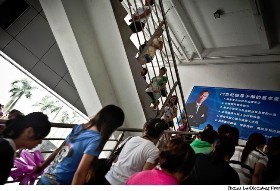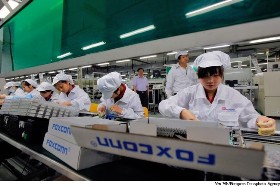Blogger's Note: China's most egregious exploitation of workers in high-tech factories like Foxconn Technologies is due to their being cheated by the company's management. Although expressly forbidden by Chinese law and perfectly transparent to regulators (if there are any), no company CEO or manager has ever been prosecuted.
 |
| Foxconn, which recruited workers at a 2010 job fair in Shenzhen, China, said Saturday it would sharply raise its wages. |
By DAVID BARBOZA and CHARLES DUHIGG
Published: February 19, 2012
BEIJING — The announcement Saturday that Foxconn Technology — one of the world’s largest electronics manufacturers — will sharply raise salaries and reduce overtime at its Chinese factories signals that pressure from workers, international markets and concerns among Western consumers about working conditions is driving a fundamental shift that could accelerate an already rapidly changing Chinese economy.
 |
| Trainees at a Foxconn industrial park in Shenzhen, China, walked beneath a poster of Terry Gou, chairman of Foxconn's parent, Hon Hai Precision Industry. |
But the true meaning of Foxconn’s reforms, analysts say, will depend in part on how effectively the company can remake an economic system that has relied for much of the last decade on luring migrants to work cheaply for long hours in mammoth factories building smartphones, computers and other electronics.
Plants depend on workers’ being at assembly lines six or seven days a week, often for as long as 14 hours a day. Such facilities have made it possible for devices to be turned out almost as quickly as they are dreamed up.
For that system to genuinely change, Foxconn, its competitors and their clients — which include Apple, Hewlett-Packard, Dell and the world’s other large electronics firms — must convince consumers in America and elsewhere that improving factories to benefit workers is worth the higher prices of goods.
 |
| Foxconn employees in Shenzhen. The company has announced plans to invest in automation. |
“But in China, for that change to be permanent, consumers have to be willing to bear the consequences. When people read about bad Chinese factories in the paper, they might have a moment of outrage. But then they go to Amazon and are as ruthless as ever about paying the lowest prices.”
Foxconn, with 1.2 million Chinese employees, is one of China’s largest employers. It assembles an estimated 40 percent of the smartphones, computers and other electronic gadgets sold around the world. Foxconn’s decisions set standards other manufacturers must compete with.
The announcement by Foxconn, which said that it would raise salaries as much as 25 percent, to about $400 a month, came after an outcry over working conditions at its factories. In recent weeks, labor rights groups have staged coordinated protests in various countries after reports that some of Apple’s Chinese suppliers operate harsh, abusive and dangerous facilities. To stem criticism, Apple hired a nonprofit labor group to inspect the plants it uses.
Workers welcomed the announced raises and overtime limits, though some were skeptical they would cause much real change. “When I was in Foxconn, there were rumors about pay raises every now and then, but I’ve never seen that day happen until I left,” said Gan Lunqun, 23, a former Foxconn worker. “This time it sounds more credible.”
By bowing to such demands, Foxconn has conceded that employees and consumers have gained a sway once possessed only by Chinese bureaucrats and executives at the global electronics firms that hire Foxconn to build their products.
Foxconn’s announcement also reflects how quickly China’s economy is shifting. Many of the country’s employers are facing labor shortages, which also puts upward pressure on wages, as do inflation and government demands to raise minimum wages.
Over 100 million migrant workers returned to their village homes this month to celebrate China’s Spring Festival, otherwise known as the New Year. Traditionally, factories have had no problem luring those workers back. But many Chinese cities are still confronting serious labor shortages, even though the holiday ended weeks ago. A recent Chinese government report said this year’s labor shortage was more pronounced than those in previous years.
And just as China’s exporters are struggling to cope with labor shortages in coastal regions, they are also confronting higher raw material costs and a strengthening Chinese currency, which makes Chinese goods more expensive in other nations.
“China can’t guarantee the low wages and costs they once did,” said Ron Turi of Element 3 Battery Venture, a consulting firm in the battery industry. “And companies like Foxconn have developed international profiles, and so they have to worry about how they’re seen by people living in places with very different standards.”
No other company in the world has quite the manufacturing scale of Foxconn. Nearly every global electronics company has some tie to the manufacturing giant, and while much of its work can be done cheaply, with low-skilled workers, the sheer volume of goods and scale of its operations make it China’s single biggest exporter.
Some of its campuses are considered small cities, with as many as 200,000 workers. Many are housed in dormitories near the assembly lines and are expected to be ready to rush into work should new orders flow in.
The Foxconn model, though, is under pressure. While most companies operate with similar dormitories, wage structures and work schedules, staffing Foxconn’s large sites has grown increasingly difficult. A new generation of young people in China are more reluctant to migrate to coastal cities, live in factory dorms and toil long hours. Many are staying closer to home, because of new opportunities in inland provinces. That has created labor shortages on the coast.
Social scientists say young people here are also less willing to accept factory jobs for long periods. Meanwhile, demographic changes have meant China has fewer young people to join the work force.
If the workers will not move to the coast, the logic is that the coastal factories ought to move to where the workers are living. Big manufacturers like Foxconn have responded to such challenges by moving factories inland.
And worried that the old model is dying, Foxconn has announced plans to invest in millions of robots and automate aspects of production.


No comments:
Post a Comment